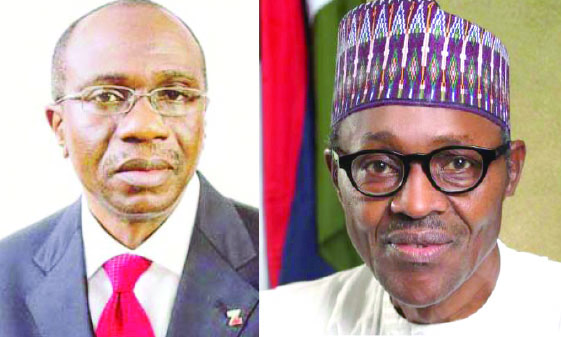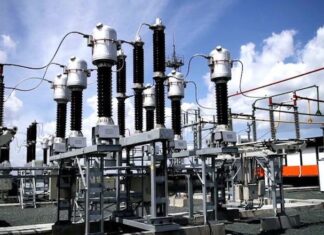By Kelechi Mgboji
Assistant Business Editor
There seems to be a new positive impact on the naira, continues to strengthen against the United States dollar, despite mixed reactions to the recent landmark currency swap Nigeria signed with the Industrial and Commercial Bank of China.
The naira averaged N318/$1 in the Bureaux de Change (BDCs) and N315/$1 in the black market last week, against N323/$1 two weeks ago.
The exchange rate remained steady at the official window and the interbank spot markets with ruling rates of N197/$1 and N199.10/$1 respectively.
However, the interbank forwards market for most tenors show appreciation of the naira. The one month, three months, six months and 12 months tenor appreciated week-on-week by 0.32 per cent, 1.46 per cent, 3.10 per cent and 1.35 per cent to N200.93/$1, N204.17/$1, N209.09/$1 and N221.14/$1 respectively.
While naira strengthening may not be attributable fully to the deal, which is yet to be executed, let us understand how the currency swap will work against the backdrop of controversy that has greeted it.
What is currency swap
Investopedia defines it is an arrangement in which two parties exchange specific amounts of different currencies initially, and a series of interest payments on the initial cash flows are exchanged.
Often, one party will pay a fixed interest rate, while another will pay a floating exchange rate (though there may also be fixed-fixed and floating-floating arrangements).
At the maturity of the swap, the principal amounts are exchanged back. Unlike an interest rate swap, the principal and interest are both exchanged in full in a currency swap.
How it will work
The Financial Derivatives Company (FDC), in its latest economic bulletin, said the Central Bank of Nigeria (CBN) will convert a certain portion of its external reserves, say, $3 billion, to naira (N200 x $3 billion = N600 billion) and deposit with the Peoples Bank of China.
The Chinese government will give Nigeria the Yuan equivalent of $3 billion.
If a Nigerian trader wants to import spare parts from China, he will approach Nigerian bank and pay N40 million for $200,000 (at N200/$1).
FDC added: “Nigerian bank opens Letter of Credit (L/C), confirmed by the Industrial and Commercial Bank of China (ICBC). Nigerian bank credits ICBC with N40 million, goods are shipped and documents negotiated.
“ICBC is long naira and short Yuan and ICBC needs to import goods from Nigeria i.e. oil at $43 per barrel (pb).
“ICBC pays NNPC (Nigerian National Petroleum Corporation) with naira at $43 pb x N200. Nigerian oil exports to the rest of the world reduces by the volume sold to China.
“Nigeria’s Yuan earnings increase and dollar revenue reduces by the same amount.”
Other experts also explained that Nigeria deposited the Yuan in Chinese banks with interest for a term period of seven years.
China will provide dollar equivalent of the Yuan to Nigeria at a spot rate for a term of seven years. At maturity, Nigeria will raise dollar to repay the China and liquidate its term deposit at Chinese banks, too.
Some believe it is a win-win situation because it will afford Nigerian importers easy access to Yuan which is also a convertible currency.
Yuan is acceptable in the U.S .and other advanced countries, having received approval for the reserve currency status.
Impact on trade balance
Analysts at FDC believe it will provide a negotiating platform for Nigeria to extract better trade and investment concessions from Western countries.
CBN Governor, Godwin Emefiele, said it would help to reduce the deficit in trading between the two countries drastically, as part of Nigeria’s deal with China is that Nigeria becomes China’s trading hub in West Africa.
His words: “China has appointed South Africa as its trading hub for Remnibi (Yuan) transactions in the South African region, and has appointed Kenya as its trading hub for East and Central Africa.
“And Nigeria, the mandate that we signed is for us to be appointed as the trading hub in West Africa. In all, we expect that it is going to be mutually beneficial.
“Will Nigeria benefit from this? I want to say categorically that Nigeria benefits from this. It’s less pressure on the dollar and consequently on our reserves.”
But analysts at FDC believe the impact on external balance would be neutral.
“Nigeria will end up importing more from China and selling more to China. It is the economic equivalent of Archimedes’ principle.
“In the end, oil revenue will not change and import volume will not. Destination of exports and origination of imports is all that will change,” the analysts said.
Demand for dollar has affected trades from China because Nigerian importers sourced for dollars to import from China and there will not be any need to get dollars on the black market to import from China.
With this, an importer does not need to convert Yuan to dollar, or naira to dollar. Therefore, it will boost business activities.
Impact on naira
On foreign exchange (forex) pressure, the question is, will this transaction make the naira stronger in the forex markets? The answer, according to FDC, is no.
“The impact on the currency pressure is neutral. This is because the swap deal does not increase the inflow of forex into the country.
“The Yuan volume is the object that is immersed in the Nigerian dollar pool. The amount of Yuan will be equal to the dollars displaced,” FDC explained.
However, other experts did not totally agree with FDC on this.
Wale Coker, associate professor of economics at Nasarawa State University, said: “It is going to reduce pressure on the naira because Nigeria imports a lot from China and since 2011, we have added the Yuan as part of currency in our foreign reserves.
“We expect that the Yuan in our reserves will increase together with dollar, pound sterling and euro. It means it is better to trade with China because of numerous importations from China.”
Nigerian importers will access Yuan more easily than dollar, to finance imports from China. Nigeria can also raise a standard bond which is dominated in Yuan.
Will this deal help curb inflation?
“No. This is because the root cause of the spike in consumer prices is the scarcity of foreign exchange and other cost push factors.
“The currency swap deal has not addressed this issue. Therefore, the problem of soaring inflation remains,” the FDC said.
The National Bureau of Statistics (NBS) recently reported that Nigeria’s inflation rate climbed to 12.3 per cent, the highest in almost four years.
This is the highest since July 2012, from 11.4 per cent in February 2016.
Food prices rose 12.7 per cent in March from a year ago, compared with 11.4 per cent in February, driven up by transportation costs, the planting season, and foreign-exchange movements, the NBS explained.
Overall, the currency deal will boost bilateral trade volumes between Nigeria and China. It will also increase Nigeria’s dependence on China for imports of raw materials and equipment
“It guarantees China a significant portion of Nigeria’s trade but our trade with the rest of the world will reduce due to lower foreign reserves. The agreement will allow Nigerian traders to transact business with Yuan instead of dollar.
“You will see more Chinese cars, TV sets, smartphones and ‘tourists.’ Crude oil sales between Nigeria and China will be settled in Yuan/naira and access to Yuan will also be easier.
“The swap will eliminate challenges arising from transactions with the U.S. dollar and promote business flexibility between Nigeria and China,” said FDC analysts.
China, master of swap deals?
China is stepping up its role as the lender of last resort to some of the world’s most financially-strapped countries.
Nigerian Tribune reports that for a number of years now, the Chinese government has been entering into these swap agreements with various countries. The swaps typically last for three years after which they are renewed or increased.
As of 2015, the People’s Bank of China had signed 31 currency swap deals totalling RMB3.14 trillion. China has a trade volume of RMB10.747 trillion with these 31 countries.
South Africa is the only African country that has signed a currency swap deal with China. Non-African countries include the United Kingdom, the European Union, Russia, Australia and the United Arab Emirates.
China in 2014 expanded a $24 billion currency swap programme to help Russia weather the worst economic crisis since its 1998 default.
China has provided $2.3 billion in funds to Argentina since October 2015 as part of a currency swap, and lent $4 billion to Venezuela, whose reserves cover just two years of debt payments.
By lending to countries shut out of overseas capital markets, Chinese President Xi Jinping is bolstering the country’s influence in the global economy and cutting into the International Monetary Fund (IMFs) status as the go-to financier for nations in financial distress.
While the IMF tends to demand reforms aimed at stabilising a country’s finances in exchange for loans, analysts speculate that China’s terms are more focused on securing its interests in resource-rich countries.
“It’s always good to have IOUs in the back of your pocket,” said Morten Bugge, the chief investment officer at Kolding, Denmark-based Global Evolution who helps manage about $2 billion of emerging-market debt.
“These are China’s fellow friends and comrades, and to secure long-term energy could be part of the motivation.”
China and Russia signed a three-year currency-swap line of 150 billion Yuan ($24 billion) in October 2014, a contract that allows Russia to borrow the Yuan and lend the ruble.
While the offer won’t relieve the main sources of pressure on the ruble – which has dropped 41 per cent since last year amid plunging oil prices and sanctions linked to Russia’s annexation of Crimea – it could bolster investors’ confidence in the country and help stem capital outflows.
Argentina received $1 billion worth of Yuan as part of the three-year currency-swap agreement with China.
In Venezuela, President Nicolas Maduro added $4 billion he borrowed from China to the country’s reserves after they fell to an 11-year low.
“I don’t think this is a broad policy to support any country that asks for Chinese help,” Bloomberg quoted an economist at Stone Harbor Investment Partners in New York, as having said in an e-mail.
“Several countries are currently in a tight spot and the Chinese are offering to help. That buys them some goodwill and influence, and promotes the use of the Yuan.”
Bilateral trade between Nigeria and China has grown rapidly in the last decade. Trade volumes rose 432.1 per cent from $2.8 billion in 2005 to $14.9 billion in 2015.
Last year, Nigeria accounted for 8.3 per cent of the total trade volume between China and Africa, and 42 per cent of total trade between China and the Economic Community of West African States (ECOWAS).
Compared with the other countries above, Nigeria’s trade volume with China alone accounted for 18 per cent of total trade with Nigeria’s major trading partners.














